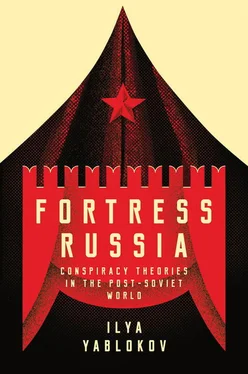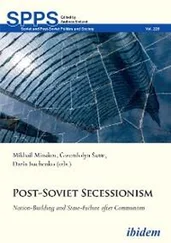In Search of the ‘Agents of Perestroika’
The attempted coup of 19–21 August 1991 was an important turning point in Russian history. The crumbling economy, ethnic conflicts in the republics and the chance to adopt a new Union treaty, which could have turned the Soviet Union into a confederation, prompted the conservative bloc in the Soviet government to set up the State Committee of the State of Emergency ( GKChP ) and introduce a State of Emergency on 19 August. However, this failed; the opposition to Communist Party rule, led by the President of the Russian Federation, Boris Yeltsin, defeated the coup, marking the victory of democratic forces in the country. The Russian Federation authorities decreed that these days would henceforth be commemorated as the starting point of a new, democratic state.
In anti-Western conspiracy discourse, however, the events of August 1991 have been interpreted as a prime example of the West’s success in challenging Russia’s greatness. Because of the breakdown of the Soviet state which followed the attempted coup, the West succeeded in imposing its rule on Russia. The remarkable failure of the GKChP to suppress a relatively small opposition fed suspicions that the coup had been staged and that treachery was at work in the highest ranks of the Soviet ruling elite. In the 1990s, various factions among the Russian conservatives disseminated these versions of the August coup and accused Yeltsin of pursuing an anti-national policy.
In the first decade of the twenty-first century, several influential members of Putin’s political elite put forward an interpretation of the August 1991 coup which stressed the conspiratorial nature of the events. The combined efforts of the state-aligned media, book publishers and pro-Kremlin politicians resulted in a reinterpretation of the events of that summer and their aftermath. By the mid 2010s, Russians had come to perceive them as a tragic episode in the country’s history and the result of a conflict within the political leadership (Levada-tsentr, 2013a). Largely thanks to the conspiratorial allegations surrounding it, the initial symbolism concerning the coup’s failure – that it marked a victory of democracy in Russia – was now rejected.
This chapter will discuss conspiratorial interpretations of Mikhail Gorbachev’s perestroika and the collapse of the Soviet Union in 1991, and the deployment of these interpretations in the political struggles of post-Soviet Russia. The August 1991 coup appears to be a foundational moment in the history of the new Russian state, thus triggering heated debates about its causes. In these debates, specific interpretations of the coup are often linked to particular conceptions of Russian identity. Throughout the post-Soviet era, interpreting the Soviet collapse through the prism of conspiracy theory has played a powerful role in redistributing power between the Kremlin and the opposition. In the 1990s it served as an ideological platform on which the forces of opposition against the Yeltsin regime were able to unite, and the notion of an engineered collapse of the USSR was used to delegitimize the president. After an unsuccessful attempt to impeach Yeltsin in 1999, which was largely based on conspiratorial interpretations of the Soviet collapse, Kremlin officials realized the value of this idea for the purposes of nation-building and delegitimizing political opponents. Thus, state-sponsored conspiratorial discourse about the Soviet collapse, shared and developed by numerous public intellectuals, facilitated the promotion of a national unity based on the memory of both the Soviet past and the dramatic experiences of the first post-Soviet years. As a result, in the 2000s attitudes towards the Soviet collapse were used by the ruling elites as a key marker distinguishing ‘the truly Russian people’ from the conspiring, alienated minority.
Language of the Intelligence Services
A common feature of conspiracy theories relating to the collapse of the Soviet Union is the notion of ‘agents of perestroika ’ ( agenty perestroiki ) who allegedly worked in close collaboration with Western intelligence to corrupt Soviet institutions and ideology. This idea is especially popular among authors with a background in Soviet intelligence, who associate the break-up of the Soviet Union with pro-Western ‘agents of influence’ ( agenty vliianiia ). The term ‘agents of influence’ is itself part of the lexicon of intelligence services. Viacheslav Shironin, a KGB general and author of three books about the conspiratorial causes of the Soviet collapse, sees the destruction of the USSR as a top-priority goal which shaped American politics for decades, and argues that perestroika was planned from abroad to aggravate the Soviet Union’s economic problems (Shironin, 2010). Another ex-KGB officer, Igor’ Panarin, claims that in 1943 the United States and the United Kingdom started the ‘First Information War’ against the Soviet Union. He argues that the Committee of 300, the Trilateral Commission and the Council on Foreign Relations waged this war by organizing subversive campaigns against the USSR. He also holds that ‘subversive agents’ in the Soviet Union, controlled by the United States, were actually discovered by the KGB, but were not ‘neutralized’ due to their connections with top-ranking Soviet leaders; for example, General Secretary Nikita Khrushchev supposedly supported them (Panarin, 2010, pp. 154, 176–81). It should be noted that two of these organizations, the Trilateral Commission and the Council on Foreign Relations, both of which are important US non-governmental and non-partisan organizations, and think tanks, also occupy an important position in conspiracy theories in the United States and Europe (Marrs, 2000).
Shironin’s and Panarin’s works do have significant conceptual differences. Shironin’s ideas are mainly concerned with subversive US activities aimed at global domination. He portrays Russia as a key adversary of the USA, with the latter attempting to undermine the former through a highly-sophisticated combination of intelligence operations. Shironin’s analysis is thus reminiscent of Soviet propaganda and its main features can be traced back to the popular culture of the Cold War period.
Panarin’s work, which was published thirteen years after Shironin’s, is clearly influenced by foreign literature on conspiracy theories available in Russia at that time, and could even be said to function as a Russian guide to Western conspiracy theories. It is likely that his concept of Western conspiracy was shaped by ideas about global conspiracy which were popular in Western Europe and the USA, and that he then reinterpreted them as exclusively anti-Russian. For instance, he identified an American banker, David Rockefeller, as a key mastermind behind the Soviet collapse. Rockefeller can be found at the centre of numerous conspiracy theories in the USA that involve the Trilateral Commission and Council on Foreign Relations (Cooper, 1991; Keith, 1995). Panarin also depicted The Committee of 300, the Council on Foreign Relations and the Trilateral Commission as the main centres of anti-Russian conspiracy in the West (Panarin, 2010, pp. 154–5). However, while these organizations do play major roles in Western conspiratorial literature, they are concerned with the creation of the New World Order, and do not specifically mention Russia.
In texts about the Soviet collapse, subversive ‘agents’ of the West are blamed for kindling nationalist movements in the Soviet republics which destroyed the multinational Soviet state. Many authors, including Panarin and Shironin, emphasize the role here of Aleksandr Iakovlev, one of Gorbachev’s closest political advisers and the mastermind of perestroika . According to the former head of the KGB, Vladimir Kriuchkov, Iakovlev was an American spy recruited in the 1950s during an internship at Columbia University (Kriuchkov, 2003, p. 324). Echoing this theory, Igor’ Froianov, a highly controversial Russian historian who was, nonetheless, dean of the History Faculty at St Petersburg State University, concluded (2009, pp. 222–4) that Iakovlev acted in agreement with Gorbachev to approve the military repressions in 1991 in Vilnius which triggered the separation of the Baltic states from the Soviet Union, a key milestone in the Soviet collapse (Suny, 1993, pp. 145–52).
Читать дальше
Конец ознакомительного отрывка
Купить книгу












